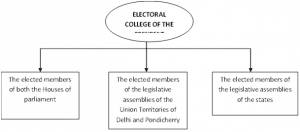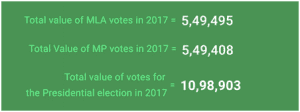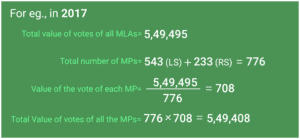“Now I am careful about the kind of roles that I do.”
-Rajendra Prasad
THE CONTEXT: In July 2022, Droupadi Murmu took oath as the 15th President of India. Chief Justice N. V. Ramana administered the oath of office to Murmu. She is the first tribal of India. Apart from it, she is the second women president of India after Pratibha Devisingh Patil. In this article, we will know the election, functions and powers of the president of India.
ABOUT DROUPADI MURMU
- Hailing from Odisha’s Mayurbhanj district and coming from a Santals Tribal Community, Murmu started as a teacher and then entered into Odisha politics; here’s everything you need to know about India’s first president from the tribal community.
- In 2015, Murmu was sworn in as the first woman Governor of Jharkhand.
- She was also the first Odia woman and tribal leader to be named governor of an Indian state and serve for the entire term of her office.
- A two-term former MLA from Rairangpur, Murmu, held on to her assembly seat in 2009 when the BJD had snapped ties with the BJP weeks ahead of the state elections swept by Chief Minister Naveen Patnaik.
- Having been born into a tribal family that was battling poverty in one of the country’s most remote and underdeveloped districts, her childhood had been full of challenges.
- Overcoming all odds, she earned her Bachelor’s degree in Arts from Ramadevi Women’s College in Bhubaneswar. She served as a junior assistant in the irrigation and power department in the Odisha government.
- She began her political career as the vice-chairman of the Rairangpur NAC. In addition, the Odisha Legislative Assembly honoured her with its Best MLA of the Year 2007 award.
- She has diverse administrative experience, having handled ministries such as transport, commerce, fisheries and animal husbandry in the Odisha government.
CONCEPT OF THE PRESIDENT: THE BACKGROUND
Constituent Assembly, while debated in Constituent Assembly, gave weightage to the parliamentary form of government over the Presidential form of government due to:
- Familiarity with the system under two centuries of British rule.
- Our forefathers prefer ‘responsible government’ over ‘stable government’.
CONSTITUTIONAL POSITION OF THE PRESIDENT
- Article 52 to 78 in Part V of the constitution deals with the Union executive. The President is the head of the Indian state. He is the first citizen of India and acts as the symbol of unity, integrity and solidarity in the nation.
- The Constitution of India has provided for a parliamentary form of government. Consequently, the President has been made only a nominal executive, the real executive being the council of ministers headed by the prime minister.
PROCEDURE OF PRESIDENTIAL ELECTION

VOTES OF MEMBERS OF
- The Electoral College, which elects the President through the system of proportional representation, comprises elected MPs and members of state legislative assemblies — a total of 4,896 voters, including 4,120 MLAs and 776 elected MPs.
- While 233 are elected members of the Rajya Sabha, 543 are from the Lok Sabha.
METHOD TO ASCERTAIN THE VALUE OF VOTE


HOW IT WORKS OUT
- The winning candidate needs to secure a certain quota of votes which is 50% of the valid votes polled +1.
- Each MP and MLA indicates his/her choices in the case of multiple candidates in order of preference.
- Each vote cast is given a value based on various factors such as the first preference order, value of the vote of each electorate, etc.
NEED TO KNOW
All doubts and disputes in connection with the election of the President are inquired into and decided by the Supreme Court whose decision is final.
DISCRETIONARY POWERS OF THE PRESIDENT
Though the President has no constitutional discretion, he has some situational discretion. In other words, the President can act on his discretion (that is, without the advice of the ministers) under the following situations:
- Appointment of Prime Minister when no party has a clear majority in the Lok Sabha (Hung Parliament) or when the Prime Minister in office dies suddenly and there is no obvious successor.
- Dismissal of the council of ministers when it cannot prove the confidence of the Lok Sabha.
- Dissolution of Lok Sabha if the council of ministers has lost its majority.
OTHER POWERS OF THE PRESIDENT
EXECUTIVE POWERS
Article 53(1) vests the executive power of the union in the president. All executive actions of the Government of India and all contracts and assurances of the property made by the Government of India are formally taken in the president’s name.
The President of India makes an appointment to other constitutional officers and other important members of the union government. These include:
- Prime Minister
- Other ministers, on the advice of Prime Minister
- Chief Justice of India
- Other Judges of the Supreme Court, on the advice of the Chief Justice
- Chief Justice and other judges of high courts
- Chairman and other members of UPSC and Joint Public Service Commissions, etc.
The executive powers vested in the president have to be exercised in accordance with the advice of the Council of Ministers as per Article 74(1). However, he has the power to send back the advice to the council of Ministers for reconsideration. If the council of Ministers adheres to the previous advice, the president has to act as per this advice.
LEGISLATIVE POWERS OF THE PRESIDENT
As a part of Parliament, President has the power to summon or prorogue the two houses of parliament.
The President may dissolve the Lok Sabha.
After the General Elections, the president addresses both the houses of the parliament.
He may address either House or a joint sitting.
He also nominates 12 members of the Rajya Sabha.
PARLIAMENT BILLS
The bills passed by the parliament become acts only after the assent of the president. When a bill is sent to President after it is passed in parliament, President has the following options:
- can either give his assent (he must give assent in case of Constitution Amendment bill),
- withhold his assent if it is not a Constitution amendment bill,
- Return the bill to the parliament for reconsideration if it is not a money bill.
- When Parliament passes again a bill sent to it with or without amendments, the president has to give assent to that bill.
STATE BILLS
Governor has been given the power to reserve a bill for consideration of the president, provided the such bill is not a money bill of that state. When the governor sends the such bill to the president, the president has the following options:
- give his assent to the bill
- withhold his assent to the bill
- Direct the governor to return the bill for reconsideration by the state legislature.
- If the state legislature again passes the bill with or without amendments; and
- If the governor again sent to the president, it is NOT obligatory for the president to give assent to the such bill.
POCKET VETO
In the case of an ordinary bill or a bill got introduced by a private member and passed by both houses, the president can just keep the bill in his pocket and forget it.
CONSTITUTIONAL AMENDMENT BILL
After the 24th amendment in 1971, it was made clear that once passed by parliament, the president has to give his assent to Constitutional Amendment Bill.
While the president cannot block a constitution amendment bill, such bills are subject to judicial scrutiny. They can be nullified by Supreme Court if they are violative of basic structure doctrine.
MONEY BILLS
Money bills can be introduced in the Parliament only with the prior recommendation of the President. Due to this President can agree to that bill or withhold his assent but can NOT return a money bill to the house for reconsideration.
THE BILLS THAT NEED PRIOR RECOMMENDATION OF THE PRESIDENT
The bills that need the prior recommendation of the president for introduction in parliament are as follows:
- Any bill that seeks to alter the boundaries of the states and names of the states. (Article 3)
- Money Bill (as per Article 110)
- Any bill which affects the taxation in which the states are interested (Article 274)
- State Bills impose a restriction on freedom of trade (Article 304).
ORDINANCE MAKING POWERS OF PRESIDENT
When both or any house of Parliament is not in session, the constitution via article 123 provides the power to the president to issue ordinances if he is satisfied with the circumstances of issuing a such ordinance. Ordinances are promulgated when parliament is not in session.
The ordinance has a similar effect to an act of parliament. However, every ordinance must be laid before both houses of the parliament within six weeks from the reassembling of the parliament; if not, it lapses.
However, it may be withdrawn by the president at any time on the aid and advice of the CoM headed by the PM.
JUDICIAL POWERS / POWER TO PARDON
Article 72 says that the President shall have the power to grant pardons, reprieves, respites or remissions of punishment or to suspend, remit or commute the sentence of any person convicted of any offence. The meaning of these terms is as follows:
- Pardon: Complete pardon
- Reprieve: Temporary suspension of sentence
- Respite: awarding fewer sentence
- Remission: Reducing amount of sentence
- Commutation: Changing one punishment to another
The power to grant pardon is not absolute and is exercised by the President on the advice of the Council of Ministers like any other power. Further, the power to pardon is subject to judicial review.
MILITARY POWERS OF THE PRESIDENT
Article 53 vests the supreme command of the Armed Forces of India in the President.
The President of India can declare war or conclude peace, under the regulation of the parliament.
DIPLOMATIC POWERS OF THE PRESIDENT
India is represented in an International forum by the President of India. He sends and receives ambassadors.
All international treaties and agreements are concluded on behalf of the President, subject to ratification by the parliament.
EMERGENCY POWERS
President has been conferred extraordinary powers in case of national emergency (Article 352), President’s rule (Article 356 & 365) and financial emergency (article 360).
THE CONCLUSION: Though the President of India is a nominal head, he has, along with some situational discretion, played a very important role in upholding Constitutional rule. Article 53 says endowed the executive power of the Union shall be vested in President and shall be exercised by him either directly or through officers subordinate to him in accordance with the Constitution.
- ‘Executive power of the Union shall be vested in President and shall be exercised directly or through officers subordinate to him by the constitution’. Discuss the essence of the statement.
- Discuss the role of the President at the time of hung parliament and also other discretionary powers that constitution endowed to him.




